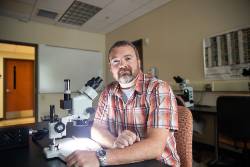Why study Geography
Do you enjoy being outdoors? Are you concerned about the environment? Do you generally enjoy science? Then the Department of Earth and Environmental Sciences is here for you! We utilize hands-on and experiential learning that emphasizes a broad examination of earth system processes, environmental management and restoration, ecosystem and atmospheric dynamics, the relationship between people and place, sustainability, and global awareness. The program prepares students for careers in environmental management, geological sciences, spatial analysis, disaster management and response, development work, and entrance into graduate studies. In addition, the geology concentration prepares students for state licensure to practice geology in the State of Tennessee.
Students who are interested in the Earth and Environmental Sciences will find a home within the Department of Earth and Environmental Sciences. Our students have turned their passions into careers with state and federal organizations like the Tennessee Department of Environment and Conservation, US Forest Service, Tennessee State Parks, US Fish and Wildlife, National Weather Service, and US Geological Survey. Many of our alumni become industry executives, environmental consultants, or leaders in multinational companies like Garmin. Students interested in furthering their education are prepared for graduate programs through our detailed curriculum. Our alumni have gone on to earn masters and doctorate degrees and become faculty at major universities in the US or used their graduate degree to further their careers.
The Department of Earth and Environmental Sciences is dedicated to providing students with undergraduate research opportunities. All of our faculty involve undergraduate students in their research projects which generally result in professional presentations at local, national, and international scientific meetings. Our majors have received various research scholarships including NSF funded Research Experience for Undergraduates and APSU awards for their research activities. These types of research opportunities for undergraduate students are rare at other institutions. We encourage our students to get involved in research activities at any time in their college career, including as early as their freshmen year. Completion of research projects help prepare students for careers or graduate-level education. Because of our close connection to the APSU GIS Center, and embedded GIS curriculum, students have an opportunity to work with the center on numerous real-world projects. Our students also have access to unique opportunities like study-abroad and service learning, and involvement in our award winning student organization the GeoClub.
All full-time faculty in the Department of Earth and Environmental Sciences have doctorates in their respective fields and have a range of real-world experience outside of the university. Students are assigned faculty advisors whose expertise matches their individual career goals. All Earth and Environmental Sciences majors receive one-on-one advising personalized to meet the desired outcomes of each student. Faculty maintain connections to local, state, and federal agencies as well as private industry and graduate programs to help students make connections and gain employment after graduation.
What will I Learn
- Students will learn about topics from Earth and environmental sciences, biogeography, climatology, dendroecology, economic geology, environmental geography, environmental geology, geographic information systems, glacial geology, hydrogeology, igneous and metamorphic petrology, landscape studies, land use policy, mineralogy, paleontology, oceanography, regional geography, remote sensing, rural geography, sedimentology, stratigraphy, structural geology and tectonics.
- The learning outcomes for each topic assist with student application of the class to their program of study.
- Classes encourage own data collection, hypotheses testing, analysis of samples and presentation of finding.
- Earth and Environmental Sciences degree offers a wide array of opportunities after graduation.
Program Information
Geography Program Requirements
Earth and Environmental Sciences: Geography Sample 4 Year Plan

